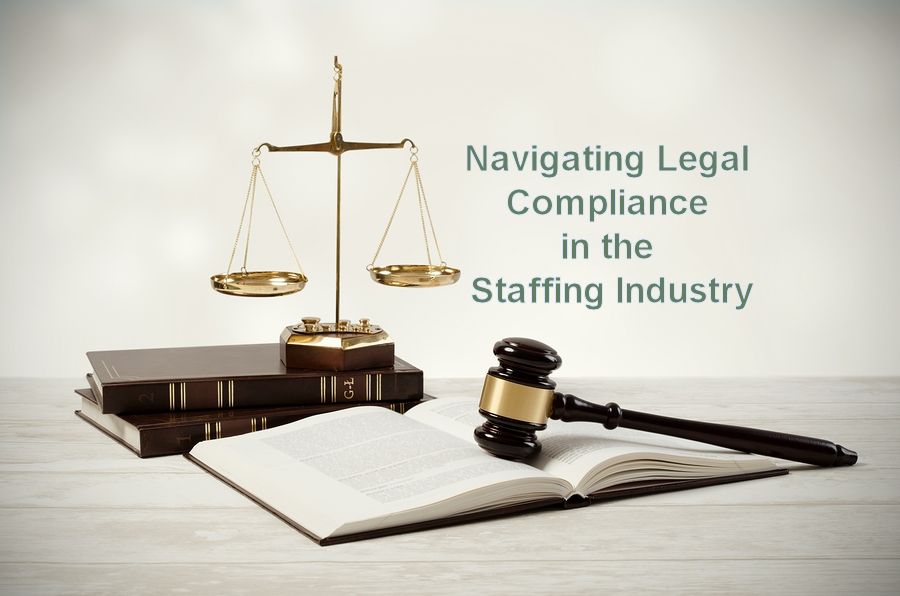As the staffing industry continues to evolve rapidly, staffing agencies are faced with a plethora of legal considerations to ensure they stay compliant with employment laws and regulations.
Failing to navigate legal compliance can result in costly lawsuits, damage to reputation, and even potential closure of the business. Therefore, it is essential for staffing agency leaders to familiarize themselves with the key legal aspects and develop strategies to mitigate risks.
In this blog post, we will discuss some important legal considerations to help staffing agencies stay compliant and provide guidance on effectively navigating legal compliance in the staffing industry.
-
Know and Understand Employment Laws and Regulations:
A comprehensive understanding of employment laws and regulations is vital for staffing agencies. Familiarize yourself with local, state, and federal laws such as the Fair Labor Standards Act (FLSA), the Americans with Disabilities Act (ADA), the Family and Medical Leave Act (FMLA), and the Occupational Safety and Health Act (OSHA).
Additionally, ensure compliance with regulations specific to the staffing industry, such as those related to temporary employees and independent contractors.

-
Proper Classification of Employees:
One of the most significant legal challenges for staffing agencies is correctly classifying employees and independent contractors. Misclassification can lead to serious consequences, including back pay claims, fines, and legal action.
It is crucial to understand the criteria for determining employee status and regularly review worker classifications to ensure compliance.
-
Implement Compliant Hiring Practices:
Staffing agencies must adhere to fair hiring practices and avoid any form of discriminatory practices. Familiarize yourself with Equal Employment Opportunity (EEO) laws, which prohibit discrimination based on race, color, religion, sex, national origin, age, disability, or genetic information.
Develop clear and standardized recruitment processes to ensure fair treatment of applicants and avoid potential lawsuits.
-
Maintain Compliance with Wage and Hour Laws:
Wage and hour compliance is a critical consideration for staffing agencies. Understand and adhere to minimum wage requirements, overtime pay rules, and regulations concerning compensable time, such as breaks and meal periods. Ensure accurate record-keeping of employee hours worked, wages paid, and any other necessary documentation to demonstrate compliance.

-
Provide Adequate Employee Benefits:
As a staffing agency, you must ensure compliance with applicable employee benefits laws. This includes offering legally mandated benefits such as workers’ compensation, unemployment insurance, and providing health insurance options under the Affordable Care Act (ACA).
Failure to comply with benefit laws can result in penalties and legal repercussions.
-
Maintain Adequate Documentation:
Proper documentation serves as crucial evidence of compliance in the event of an audit or lawsuit. Maintain thorough records of employee onboarding, training, performance evaluations, pay rates, hours worked, and any modifications to terms of employment.
Regularly review and update personnel policies and employment contracts to reflect changes in legal requirements.
-
Stay Abreast of Legal Updates:
Employment laws and regulations evolve over time, and keeping up with the changes is vital. Engage in ongoing professional development and monitor legal updates relevant to the staffing industry. Join industry associations, attend seminars, and seek legal guidance to stay informed about any changes that may affect your compliance obligations.

In conclusion, legal compliance is of paramount importance in the staffing industry. By understanding and adhering to employment laws and regulations, staffing agencies can protect themselves from legal risks and ensure fair treatment of their employees.
By implementing the guidance provided in this blog post, staffing agency leaders can navigate legal compliance more effectively, mitigating potential legal issues and fostering long-term success in the industry.


